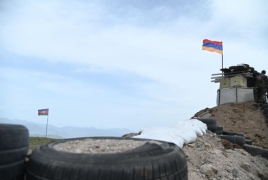
On April 12 and 13, 2025, the legal team of former Human Rights Defender of Armenia Arman Tatoyan conducted a fact-finding mission in the Syunik Province, focusing on the villages of Tegh, Aravus, Khnatsakh, Nerkin Hand, Chakaten, and other border communities. The purpose of the visit was to prepare specific applications to be submitted to international bodies, including judicial institutions. Tatoyan shared this information on his Facebook page.
He stated that recently, Azerbaijani armed forces have been firing irregular bursts of gunfire almost every night, typically between 10:30 p.m. and 6:30 a.m., targeting Armenian villages. According to him, just before their visit, Azerbaijani gunfire damaged solar water heaters installed on the roof of a house in one of the villages.
“As before, it was again confirmed that residents of Tegh, Khnatsakh, Khoznavar, Aravus, Nerkin Hand, Chakaten, and other villages have lost access to pastures, farmland, hayfields, and orchards, as most of these areas are now under Azerbaijani control or within firing range. Animal husbandry and pig farming have nearly vanished or severely declined, and the orchards that once served as the main source of income are now either inaccessible or dangerous to reach—such as in Tegh, Aravus, and Nerkin Hand,” the post reads.
The situation in Nerkin Hand is particularly alarming, where Azerbaijani forces have been increasingly planting landmines in and around the village.
“The village is surrounded on three sides by Azerbaijani military positions. In fact, most of their posts are within Armenia’s sovereign territory. The landmines they have placed are dangerously close to civilian homes in Nerkin Hand—sometimes within just a few hundred meters,” Tatoyan noted.
He stressed that politically justifying Azerbaijani gunfire as “non-targeted” is entirely incorrect.
Azerbaijani troops have mined areas near their positions, endangering villagers’ lives and agricultural operations. The residents’ orchards—often their sole source of income—are now under Azerbaijani control, and most are heavily mined. Mines include both TM-57 anti-tank and OZM-72 and PMN-2 anti-personnel types. For instance, at one Azerbaijani post, the mines were located 70-80 meters away from their positions, with anti-personnel mines as close as 10-30 meters.
The fact-finding team also learned that just days before their visit, livestock belonging to local residents were killed by a mine explosion.
“These facts cannot be ignored. The only way to restore safe and normal life is to eliminate these violations of rights,” Tatoyan emphasized.
At approximately 2:30 a.m. on April 20, Azerbaijani military units opened fire in the direction of the village of Khoznavar in Syunik Province, damaging a solar water heater on the roof of a residential house. No injuries were reported.

